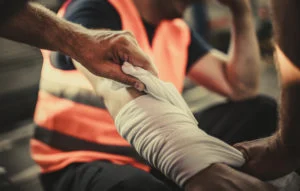What to Do If You’re Injured on the Job in NYC

While New York is a Workers’ Compensation State, which means that workers are automatically covered by New York’s Workers’ Compensation system, many people who have been injured on the job mistakenly assume that all claims for job-related injuries are covered by that system, which generally prevents injured employees from suing their employers.
That’s why it’s very important that you contact a qualified personal injury attorney as soon as possible after you’ve been injured on the job: he or she will be in the best position to advise you of your rights, and making the contact early will prevent you from missing any important deadlines you’ll encounter when filing a lawsuit.
What is Workers’ Comp?
New York’s Workers’ Compensation System was set up more than 100 years ago with a worthy goal: to spare workers the difficult and expensive task of having to hire lawyers to prove that the negligent conduct of an employer led to the worker’s accident. In exchange for giving up the right to sue their employers, workers were guaranteed a set of benefits, including compensation for lost wages and payment for medical care associated with their injury. Employers, for their part, were required to carry insurance to pay for these benefits. Workers’ Comp resembles New York’s current “no fault” auto insurance system in the sense that no fault needs be found before some level of compensation can be paid out.
Exceptions to Workers’ Comp
There are, however, important exceptions to the Workers’ Comp law that you need to understand if you’ve been injured on the job. The most important refers to 3rd-party liability.
In today’s workplace, it’s often the case that 3rd-party contractors are involved in some aspect of the work. For example, on a construction site, one typically finds more than one contractor working on the project who is not the “employer” of the worker. If any one of those contractors causes one’s injury, any claims for compensation must bypass Workers’ Comp.
Similarly, employees who must travel as part of their work may also suffer work-related injuries that are not caused by their employer; for example, collisions with other drivers or with roadside hazards negligently maintained by 3rd parties. Domestic workers may slip and fall on surfaces improperly maintained by 3rd-party cleaning companies. And workers in a wide range of occupations can be injured on the job by defective products produced by 3rd parties.
Such claims for work-related injuries involving 3rd parties must be pursued in court, not within the Workers’ Comp system.
What You Must Do After Your Accident
The very first thing that you need to do after your accident and after receiving any required medical treatment is to contact a personal injury attorney experienced in employment-related injury cases and have a discussion about what happened to you.
It’s possible that the best course of action for you may be to pursue your claim through the Workers’ Comp system. If so, you’ll need to perform certain actions required by that system, including notifying your employer of your injury in a timely manner (within 45 days) and notifying Workers’ Comp (within 2 years of your accident).
You may also learn that because your injury was caused – in whole or in part – by the negligence of 3rd parties, your best course of action may be to file a lawsuit against these 3rd parties and seek compensation above and beyond the limited benefits provided by New York’s Workers’ Compensation system. Either way, it’s important to learn about your rights as early as possible because New York has an ironclad 3-year statute of limitations applying to personal injury lawsuits.
If you’ve been injured and wish to speak with one of Greenberg Law P.C.’s attorneys, we’d be glad to have a conversation with you about your experience.
Free Attorney Consultation
Fields marked with an * are required
"*" indicates required fields

